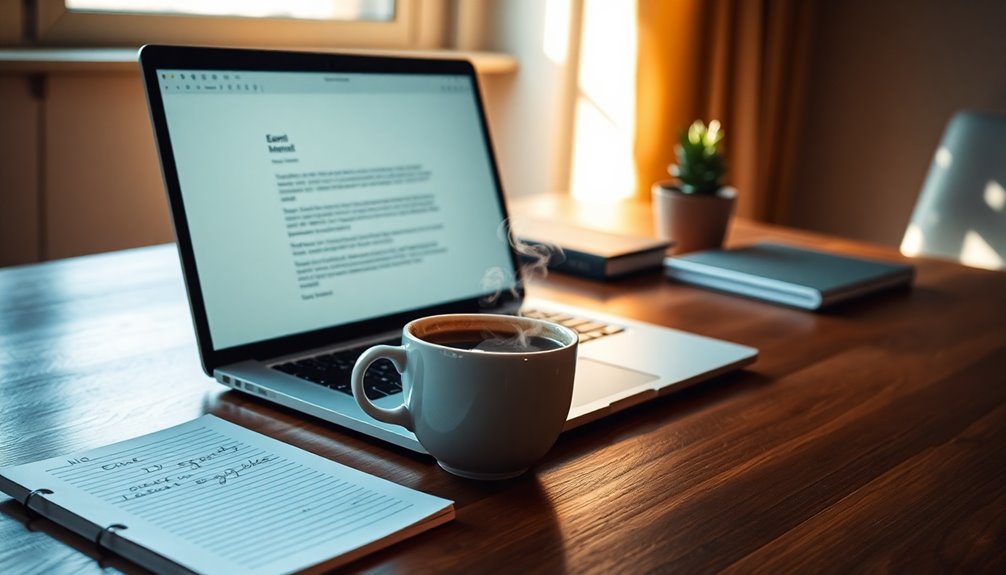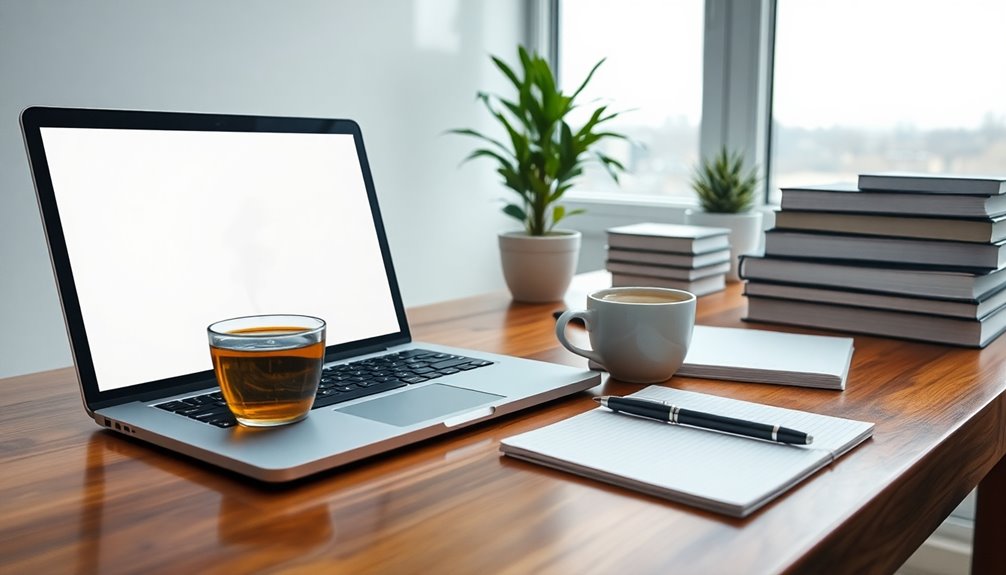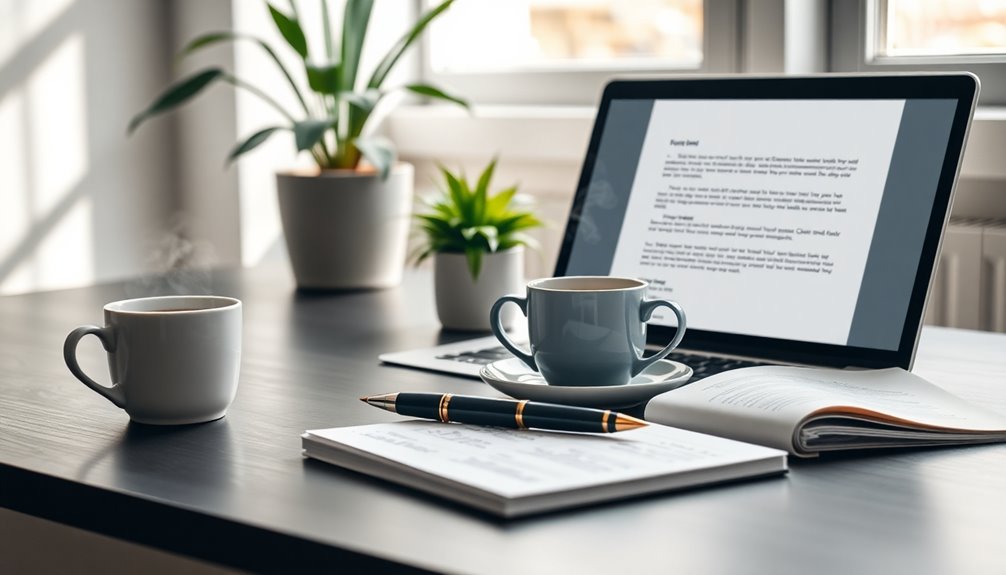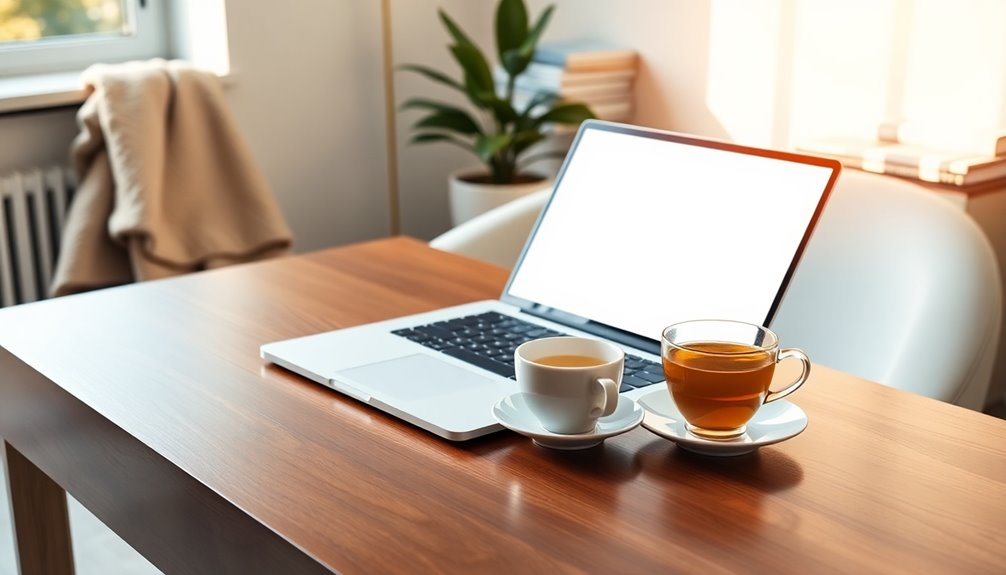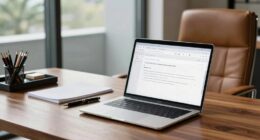To write a follow-up email after your interview without being pushy, aim to send it within 24-48 hours. Start with a professional subject line like, "Thank You for the Opportunity." Express gratitude and reiterate your interest in the position. Reference specific points discussed during the interview to show genuine engagement. Keep it concise and maintain a respectful tone. If you haven't heard back after five business days, a gentle second follow-up is appropriate. Always proofread your email to ensure clarity and professionalism. There's plenty more to discover about making your follow-up stand out!
Key Takeaways
- Send the follow-up email within 24-48 hours to express gratitude and enthusiasm without pressuring the interviewer.
- Personalize the message by referencing specific topics discussed during the interview to reinforce your fit for the position.
- Maintain a professional tone and avoid overly casual language to reflect your commitment to the opportunity.
- Include a clear call to action, such as asking for updates, while respecting the hiring timeline and process.
- If no response is received, consider a gentle second follow-up after five business days, ensuring not to appear overly persistent.
Introduction
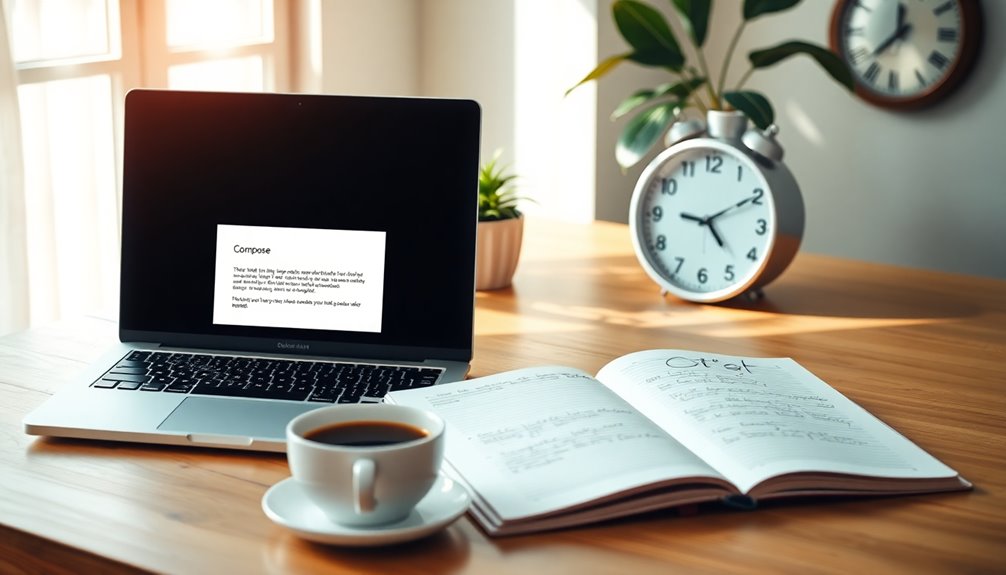
Navigating the job interview process can be daunting, but a well-crafted follow-up email can significantly enhance your chances of making a lasting impression. Timing is crucial, so make sure you send your follow-up within 24 hours after the interview. This shows your eagerness and respect for the interviewer's time. Additionally, sending a thank-you email promptly helps reinforce your enthusiasm for the role.
If you need to send a second follow-up, wait about five business days or a week after the final interview to give the interviewer time to assess other candidates.
When composing your email, keep the subject line simple and clear. Use a professional salutation and ensure your email is well-formatted and free of errors. Thank the interviewer for their time, reiterate your interest in the position, and highlight relevant skills.
Reference specific topics discussed during the interview to remind them of your conversation. If multiple interviewers were involved, personalize each email accordingly.
Maintain professionalism throughout, regardless of the atmosphere during the interview. By following these guidelines, you'll create a follow-up email that stands out, reflects your professionalism, and keeps you fresh in the interviewer's mind.
Demonstrates Your Enthusiasm
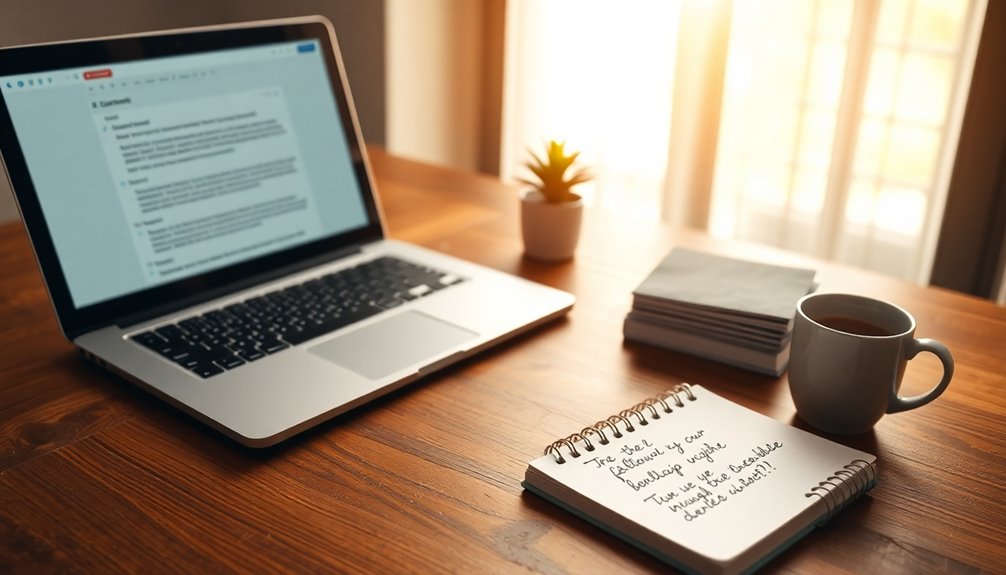
Sending a thoughtful follow-up email not only reinforces your professionalism but also demonstrates your enthusiasm for the role. Start by expressing gratitude for the interview opportunity and reiterating your interest in the position and the company.
Mention how the interview strengthened your desire to join the team, emphasizing your alignment with the company's values and goals. Additionally, consider how your mental wellbeing might positively contribute to team dynamics and productivity in the workplace. Maintaining positive energy can also help create a more engaging work environment that benefits everyone involved. Engaging with new experiences can also foster a positive mindset that enhances your contributions to the team. Research shows that positive thinking enhances mental well-being and resilience, which can further benefit workplace culture.
Reference specific topics or projects discussed during the interview to highlight your engagement. Recall any shared interests that came up, showcasing your connection with the company culture.
If there were any demonstrations or skills tests, reference them to illustrate your relevant experience and newfound insights that deepened your interest.
Next, align your skills with the job requirements. Detail how your strengths match the expectations for the role, and provide examples of past experiences that demonstrate your qualifications. Additionally, consider sending the email a few days after the interview to allow the interviewer to process candidates and increase the chance of a thoughtful response.
Personalized Subject Line

Crafting a personalized subject line can significantly impact the effectiveness of your follow-up email. Keeping it simple and clear is key. If you're replying to an existing email, use the original subject line for continuity.
Including the job title or details about your interview gives your email context, making it easier for the recruiter to remember who you are. Incorporate relevant keywords like "Thank you," "Follow-up," or "Interview" to clearly indicate the purpose of your email.
Mention the date or time of the interview to add clarity, and don't forget to include your name—this helps jog the recruiter's memory. Tailor the subject line specifically to the job and the interviewer. Effective follow-ups can enhance candidate perception and increase your chances of making a positive impression. Additionally, consider how a well-structured follow-up can reflect your professionalism and attention to detail. Including a touch of natural alternatives in your communication style can also showcase your creativity and thoughtfulness. Moreover, understanding credit score basics can help you navigate potential financial discussions related to job offers.
Avoid complicated or witty phrases; straightforward works best. If you're on first-name terms, feel free to use their first name; otherwise, stick with their title and surname.
For practical examples, you might consider: "Thank you for your time today," "Follow-up: [Job Title]," or "John Smith – Re: Interview on Tuesday at 4pm." A well-crafted subject line sets the right tone for your follow-up email and ensures it gets noticed.
Follow-Up Email Blueprint

After your interview, having a clear follow-up email blueprint can make a significant difference in your job search. Aim to send your email within 24-48 hours after the interview, but don't rush it; waiting a few hours or until the next business day shows thoughtfulness. If it's your final interview and you haven't heard back after a week, a second follow-up is appropriate.
Start your email by thanking the interviewer for their time and the opportunity to discuss the role. Reiterate your interest in the position and highlight specific skills or strengths relevant to the discussion. Mention particular topics or instances from the interview to demonstrate your engagement. Follow-up emails are essential for standing out among other candidates and can influence hiring decisions.
Keep it concise—just a few sentences or a paragraph will do.
Maintaining a professional tone is crucial, regardless of how casual the interview felt. Use a clear format, and ensure your email is free of typos. Conclude politely and invite any further questions.
Including something memorable from your conversation can help jog the interviewer's memory, while expressing enthusiasm for the role reinforces why you're a great fit. Don't forget to provide your contact information for easy follow-up.
Dos and Don'ts for Follow-Ups
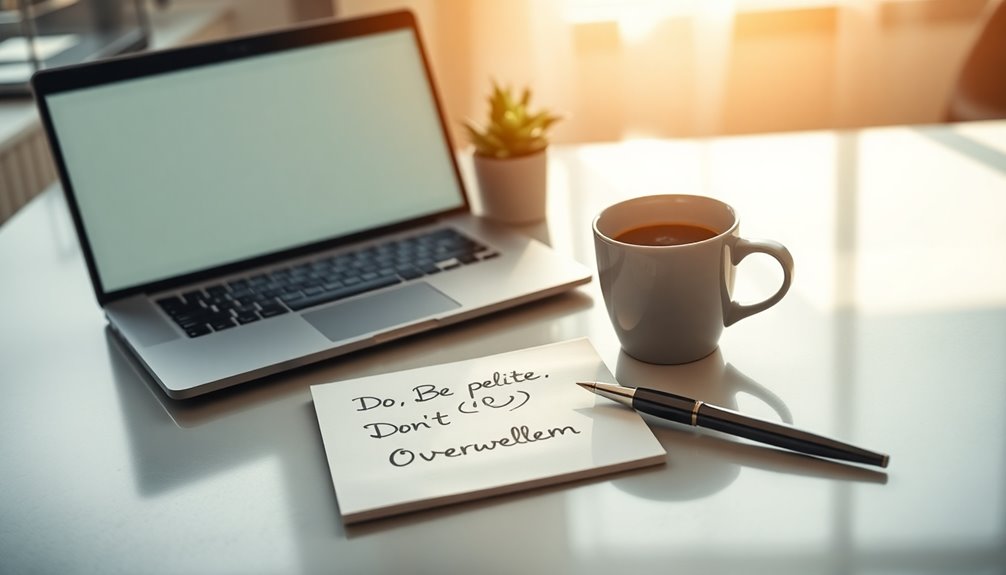
How can you ensure your follow-up email stands out positively after a job interview? First, pay attention to timing. Send your follow-up within 24 hours to show your enthusiasm. If you don't receive a response, wait about five business days before sending a second follow-up.
Personalization is key; reference specific details from your conversation to make your email memorable. Highlight shared interests or relevant skills that align with the job to reinforce your fit for the role. Remember that 91% of employers appreciate receiving follow-up thank-you notes, which can further enhance your chances.
When crafting your email, thank the interviewer for their time and express your continued interest in the position. Keep the tone professional and avoid coming off as pushy. Don't follow up excessively if you don't hear back.
Refrain from using humor or overly casual language, and ensure your email is concise—no need to rehash the entire interview. Each thank-you email should be tailored to each interviewer, avoiding redundancy.
Follow-Up Email Samples

Following up with a well-structured email can significantly impact your chances of landing the job. Here are a few samples you can customize based on your interview experience.
Subject: Thank You for Your Time Today
Hi [Interviewer’s Name],
Thank you for taking the time to meet with me today. I enjoyed our conversation about [specific topic discussed] and am even more excited about the opportunity to join [Company Name] as a [Job Title].
I believe my skills in [specific relevant skills] will contribute positively to your team. Following up after an interview demonstrates your commitment to communication, which can enhance your candidacy. Could you share any updates on the next steps in the recruitment process?
Best,
[Your Name]Subject: Follow-up: Interview on [Date]
Hi [Interviewer’s Name],
I hope this message finds you well. I wanted to express my gratitude for our discussion on [specific point discussed].
I'm thrilled about the chance to work with [Company Name] as a [Job Title] and think my background in [relevant experience] aligns well with your needs.
Do you have any updates regarding the timeline for the hiring process?
Thank you!
[Your Name]These templates keep your follow-up professional and personal, making a lasting impression.
Pro Tips for Writing Effective Emails

Crafting an effective follow-up email is crucial for making a lasting impression after a job interview. Send your thank-you email within 24-48 hours to keep your candidacy fresh in the recruiter's mind. If you haven't heard back after five business days, follow up again. Avoid reaching out too frequently, as this can come off as pushy.
When it comes to the subject line, keep it simple and relevant, such as "Thank you for your time today." Start your email with a proper salutation, like "Dear [Mr./Ms. Last Name]."
Keep your email concise; a few sentences or a short paragraph is enough. Personalize your message by referencing specific topics discussed during the interview. Highlight your skills and express your gratitude for their time while reiterating your interest in the position. A follow-up can reinforce positive impressions made during the interview and further solidify your candidacy. Incorporating mental clarity techniques can also help you articulate your thoughts more effectively in the email.
Maintain a professional tone—avoid sounding desperate or demanding. Before hitting send, proofread your email to catch any typos or errors. Address any concerns that arose during the interview, and finish with a professional sign-off, like "Best regards" or "Sincerely."
This thoughtful approach will help you stand out positively.
Final Thoughts
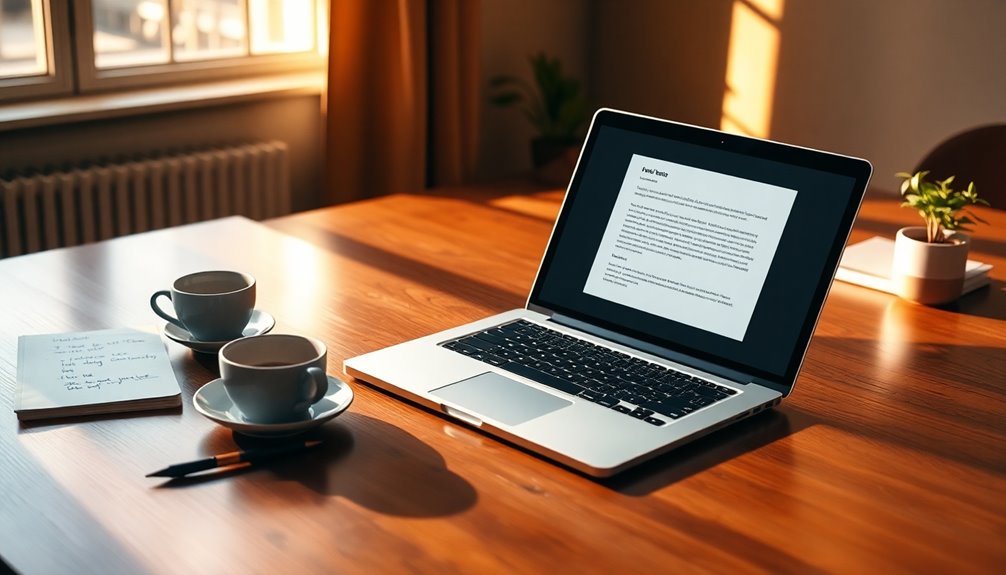
In the days following your interview, it's essential to reflect on your approach and the impression you left. Crafting a thoughtful follow-up email can reinforce your interest and professionalism. A well-crafted message allows you to express gratitude for the opportunity, reiterate your enthusiasm for the role, and highlight key points from your conversation. To write a perfect followup email, ensure your tone is polite, concise, and tailored to the interviewer. Taking the time to personalize your email demonstrates attention to detail and can leave a lasting positive impression.
Remember to maintain a professional tone; even if the interview felt casual, avoid humor or informal language. Use appropriate titles and last names if you're unsure about the level of formality.
Timing matters too. Send your first follow-up within 24 hours, and if you don't hear back, consider a second email five business days later. Follow-up emails enhance your chances of standing out among other candidates.
Personalize each message by referencing specific topics discussed during your interview. This shows you were engaged and genuinely interested in the role.
Be concise. A few well-structured sentences thanking the interviewer and reiterating your interest can go a long way.
If there were any concerns or questions raised during your meeting, address them directly. Close your email with an invitation for further questions and a clear call to action, like asking for an update on your application status.
Frequently Asked Questions
How Long Should I Wait Before Sending a Follow-Up Email?
You should wait about 24 to 48 hours before sending a follow-up email after your interview.
This timeframe keeps you fresh in the recruiter's mind while showing your organization and eagerness.
If it's a final interview, you can wait up to five business days.
Just remember to consider the hiring process timeline; being patient is essential as they evaluate other candidates.
A thoughtful follow-up can reinforce your interest effectively.
Should I Mention Other Job Offers in My Follow-Up?
You might wonder if you should mention other job offers in your follow-up.
It's best not to. Doing so can come off as pushy or desperate, which you want to avoid.
Instead, focus on expressing your enthusiasm for the position you interviewed for. Highlight how your skills align with the role and ask about the next steps.
This approach maintains professionalism and reinforces your genuine interest in the company.
Can I Follow up Multiple Times?
Yes, you can follow up multiple times, but keep it limited.
Start with a thank-you email within 24 hours, then wait about a week for your next one if you haven't heard back.
Each follow-up should be polite and concise, adding value by referencing your skills or addressing any concerns.
Just remember, you don't want to overwhelm the interviewer—be respectful of their timeline and avoid excessive emails.
What if I Don't Hear Back After My Follow-Up?
If you don't hear back after your follow-up, wait about a week before reaching out again.
Keep your tone professional and polite; frustration won't help. Mention something from your interview to jog their memory, and express your continued interest in the role.
Ask for an update on your application status and offer to provide any additional information they might need.
Is It Appropriate to Ask for Feedback in My Email?
Yes, it's appropriate to ask for feedback in your follow-up email, but keep it specific.
Instead of asking broad questions, focus on particular aspects of the interview that you want to improve. This shows you're proactive and genuinely interested in growth.
Just remember to phrase it as optional, allowing the interviewer to respond at their convenience.
Timing is key, so wait until after your initial thank-you email to ask.
